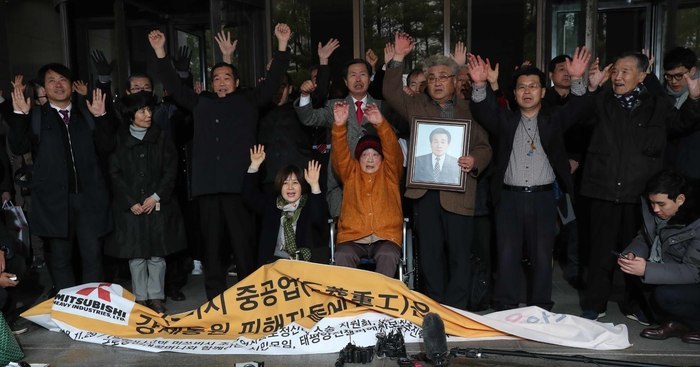 |
|
Forced labor victims and their families celebrate after winning a lawsuit against Japanese firms in a Supreme Court case on Nov. 29, 2018. (Park Jong-shik, staff reporter)
|
Attorneys waiting to initiate conversion procedures to turn patent rights into cash
Survivors from the Women’s Volunteer Labour Corps during the Japanese occupation were granted a court request to seize Mitsubishi Heavy Industries assets in South Korea. On Mar. 25, the group Citizen Forum for Halmuni announced that the Daejeon District Court had granted approval of a request to “confiscate two trademark rights and six patents belonging to Mitsubishi Heavy Industries” on Mar. 22. The result was an effective freezing of Mitsubishi’s corresponding assets. “We do not see any meaning in waiting from a response from Mitsubishi,” said Kim Jeong-hee, one of the attorneys in the labor corps compensation case. “Now that Mitsubishi’s domestic assets have been frozen, we are planning to initiate conversion procedures for the patent rights et al.,” Kim added. “Conversion procedures” refers to the auction of the seized patent rights to convert them into cash. The four labor corps survivors stated an attachment face value of 840 million won (US$742,135) to the court. “While we can’t confirm the asset value of the patent rights, they are likely to exceed the face value in light of the typical value of patent rights for large corporations,” Kim said. The Japanese government previously warned of economic retaliation and other measures if Japanese companies suffer asset losses due to the initiation of conversion procedures. Commenting the same day on the Daejeon District Court’s decision to approve the asset seizure, Japanese Chief Cabinet Secretary Yoshihide Suga said, “We view it as very serious that the South Korean government is not taking concrete measures to rectify the violation of the Japan-Korea Claims Settlement Agreement, and that the attachment by the plaintiffs is going ahead.” Echoing Tokyo’s previous stance on the issue, Suga pledged to “respond appropriately from a consistent position while keeping in close contact with the relevant companies in the interests of legitimate economic activity by Japanese corporations.” A South Korean Ministry of Foreign Affairs official explained that Seoul “plans to uphold the principle of not intervening in decisions by the judiciary.” “As no immediate economic losses are occurring for Japanese corporations, Japan will not proceed with economic retaliation and other measures that further worsen South Korea-Japan relations,” the official predicted. “Since we are not at the stage of converting the seized assets into cash, Japan is not going to take any immediate measures,” said Yang Kee-ho, professor at Sungkonghoe University. “But given the victims’ advanced age, the cash conversion cannot continue to be delayed, and Japan is expected to respond sternly when the cash conversion is initiated in the near future,” he added. By Jang Yee-ji and Park Min-hee, staff reporters Please direct comments or questions to [english@hani.co.kr]






